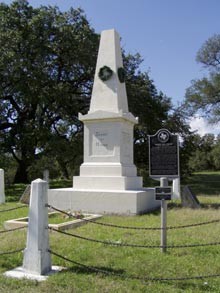"Except for the harsh conditions of living on the frontier of Texas, they were able to achieve almost a Utopian society here until the Civil War started," says Greg Krauter, a descendant of Freethinkers who owns the Ingenhuett Store, the oldest continuously operating store in the state. The Ingenhuett legacy is apparent in a large block of historical properties in downtown Comfort, and include the general store (opened in 1867), an old opera house, and a restored period home.
Though the ideas of the Freethinkers carry valuable moral currency today, the community suffered for their beliefs. After the beginning of the Civil War, the Freethinkers refused to sign an oath of loyalty to the South. As the 1866 Treuer der Union monument attests, this had grave repercussions for the settlers: 36 Freethinkers — German, Anglo, and Mexican alike — were killed by Conferate soldiers as they fled to Mexico to avoid conscription in the rebel army.
| The Treuer der Union monument was erected in 1866 after a group of Freethinker settlers were killed by Confederate soldiers. Photo by Tucker Teutsch |
What is not discussed in Comfort (at least not often in public) is the question of the Freethinkers' religious beliefs — though the subject has divided the community, and pitted members of local churches against so-called "atheist groups."
The controversy, some say, began when outsiders turned the Freethinker cenotaph into a keystone of atheist activism. Over time, word got around that atheists were making "pilgrimages" to the memorial, and soon the local congregations were "stirred up like a hornet's nest," says a Comfort resident who wishes to remain anonymous.
In a town of about 1,200 people, 700 signed a petition to have the cenotaph, a 32-ton chunk of sand-colored limestone — referred to in some of the more fervent congregations as "Satan's Rock" — carted away from a public park and dumped in a quarry north of town.
The removal of the 1998 memorial raised hackles among some members of the community, including Greg Krauter, who felt that the history of the town's founders had been trampled by religious zealots. For their part, Christians point out that Atheists' attraction to the Freethinker label has not endeared them to many of the town's residents. Others just want to defend the founding settlers' record. Their failure to build churches in Comfort early-on was not an expression of atheism, say a number of locals, but a passive rejection of organized, denominational religion.
Indeed, Comfort's skyline (if the small, rural community can be said to have one) is not dominated by steeples, like so many other Texas towns. Instead, the hard-wrought German architecture of the 19th century is prominent, and numerous antique stores thrive and rely heavily on the town's historical legacy.
That history is now being called into question, though Krauter would like to set the record straight. "Hell, Freethinkers are individualists, you can't categorize them," he says. "They're all types of people. These Freethinkers included '48ers, communists, people that believed in a higher power, or powers; they included atheists, they included the whole nine yards. The important thing is the freedom that they were able to enjoy, and that they achieved here."
To that end, Krauter and a group of supporters raised funds to set a bronze plaque into a new cenotaph on the sidewalk in front of the Ingenhuett Store. The cenotaph is constructed of stones from a number of historical sources, including a few discarded limestone blocks from the Ingenhuett Opera House. The plaque, embossed with an image of an eagle under the words, "Die Gedanken sind frei" (Thoughts are free), tells the story of the Freethinker settlers, and reads, in part:
"Instead of religious dogma, Freethinkers believed in individual philosophy: Secular education and organizations (Vereins) provided social and cultural fulfillment." It also states that outside influences (including the arrival of the railroad in 1887) were the impetus for the construction of the first church in Comfort in 1892.
Though the tone is far from inflammatory, one resident expected few locals to show up for the November 2 dedication. But last Saturday, more than 300 supporters attended. While some locals made an appearance, most of the visitors drove from Kerrville and San Antonio for the event. Nevertheless, said one resident, there are some people in Comfort who refuse to enter the Ingenhuett Store because of the stand Krauter has taken in support of the memorial.
Asked about a drop in business, Krauter says he hasn't noticed it. But, he says, "There's things that are more important than money. Like protecting my family's honor, for instance."
So: Were the Freethinkers devout atheists, or were they simply pragmatists who settled in Comfort to escape the oppressiveness of a heavily regimented German society? Certainly the Hill Country is no stranger to quirks of character and fierce individualism, and the rule of thumb 'til now has been "Live and let live." But when it comes to uncomfortable matters of religion, it seems silence is golden.


















